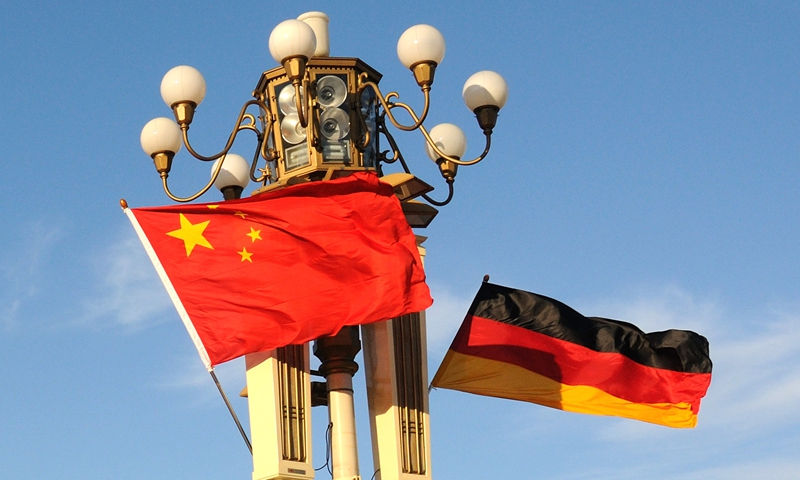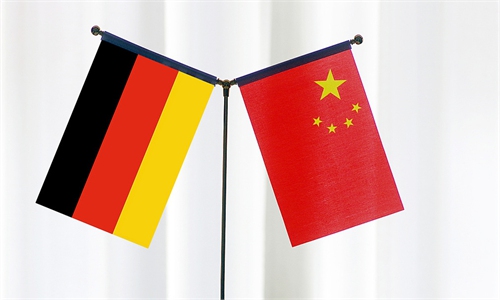Chinese commerce minister discusses EV, digital economy, new energy cooperation with German officials

China Germany: Xinhua
China's commerce minister met with senior officials and business communities in Germany, aiming to promote the implementation of bilateral economic and trade consensus, maintain the stability of industrial and supply chains, and boost cooperation in various fields, such as electric vehicles (EVs) and new energy.
Analysts pointed out that China and Germany are complementary in global industrial and supply chains, and have huge potential for expanded cooperation. The bilateral meetings will further boost cooperation in trade and industries.
On Wednesday and Thursday, Chinese Minister of Commerce Wang Wentao met with representatives from the German business community separately in Berlin, including executives from German Mechanical Engineering Industry Association, German Chamber of Commerce and Industry, ZEISS Group and TRUMPF, according to the Ministry of Commerce of China (MOFCOM).
Wang's visit to Germany is part of his Europe tour.
Wang said that the Chinese modernization process would provide a broad market with many cooperation opportunities for enterprises from Germany and other countries.
The German business representatives expressed their firm confidence in cooperation with China as well as their willingness to further expand trade and investment with China and explore more opportunities in the Chinese market.
On Wednesday, Wang met with Dirk Hilbert, Mayor of Dresden, in Berlin. The two sides held a candid and practical discussion on such topics as deepening local trade and economic cooperation between the two countries, promoting green and low-carbon transition and digital transformation, and strengthening cooperation on EVs and new energy, MOFCOM confirmed.
On the same day, Wang met Wolfgang Schmidt, Head of the Federal Chancellery of Germany. They agreed to expand traditional cooperation while tapping potential in emerging areas such as new energy and the digital economy. They would further create a fair and equitable environment for Chinese and German businesses.
On Tuesday afternoon, Wang met with Markus Soeder, Bavarian Minister-President, in Munich. They discussed such topics as expanding bilateral trade and investment, upholding the stability of industrial and supply chains, and stepping up green and low-carbon cooperation.
China and Germany are important economic and trade partners, and their industrial and supply chains are deeply integrated, a spokesperson from MOFCOM said in March.
Zhang Xiang, visiting professor with the Engineering Department of Huanghe Science and Technology University, cited EVs as an example.
"China is ahead in new-energy and intelligent connected vehicles, while Germany is strong in traditional car-making technology and precision machining. In the field of EVs and new-energy vehicles, China and Germany have strong complementarity and room for cooperation," Zhang told the Global Times on Thursday.
Zhang said that German automakers work with Chinese suppliers, and vice versa.
A manager of a Chinese LiDAR supplier also told the Global Times that they serve global automakers, including those from Germany.
"China's manufacturing and research and development (R&D) on LiDAR, which helps the vehicle sense and understand its surroundings, have taken a global leadership position. If an automaker wants to equip its car with autonomous driving system, it can't avoid advanced LiDAR systems and products made in China," said the manager, who declined to be named.
Over the years, China-Germany economic and trade cooperation has maintained high-quality development momentum, Chen Jia, an independent analyst on global strategy, told the Global Times.
"China has formed a long-term cooperative partnership with Germany's superior industries in high-tech. The bilateral manufacturing industrial chain has been deeply integrated, especially in the high-precision processing of industrial equipment, parts and materials," said Chen.
Chen noted that an efficient division of labor cooperation has been established between China and Germany, resulting in competitiveness in global industrial chain.
According to MOFCOM statistics, China has been Germany's largest trading partner for seven consecutive years, and Germany has been China's largest trading partner in Europe for 48 consecutive years.
The two-way investment between the two countries has reached $51.4 billion in the first quarter this year. By 2022, over 5,000 German companies had invested in China and over 2,000 Chinese companies had been operating in Germany, official data showed.
One of the latest examples is the Volkswagen Group, which on April 18 announced plans to invest 10 billion euros ($10.95 billion) to set up a new company in Hefei, East China's Anhui Province to speed up R&D and innovation on intelligent connected vehicles.


